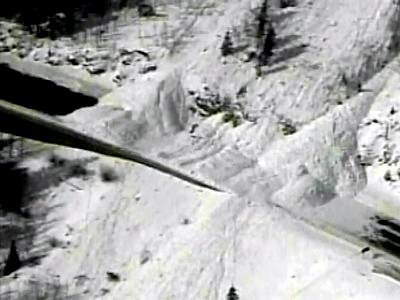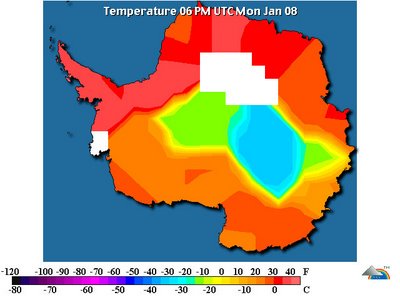 Avalanche Sweeps Cars Off Colo. HighwayExperts: Avalanche Danger Remains High (Please exercise caution at ALL times.)BERTHOUD PASS, Colo. -- Eight people were swept away by an avalanche in Colorado last weekend while they were driving in their cars -- and they all lived to talk about it.It happened in Berthoud Pass, Colo., which is west of Denver. "I think we tumbled, flipped, three, four times," said Dave Boon, who was driving Saturday morning with his wife and a family friend. They were heading to the Winter Park Ski Resort. Boon said he was coming around a curve when he first saw the avalanche to the left of the straight road ahead. Three-hundred-feet wide, the avalanche broke into three sections. The biggest one sent a 15-foot mountain of snow crashing into a van and Boon's car. "It was like a freight train hit us from the side," Boon said. It blew in his window and filled the car with snow. It then lifted the car up and over the guardrail and sent it rolling down the slope. The car flipped three or four times and tumbled 200 feet down the mountain. It hit a small tree, which snapped off, stopping the car upside down in 15 feet of snow with only its wheels sticking out of the snow. The van carried five members of an Iowa Church. "As we were rolling, I just said, 'Lord, please protect us,'" said survivor Darren Johnson. "He truly did because we're all alive." An avalanche rescue team happened to be training nearby. And experienced back-country skiers, who had avalanche gear with them, were among the first to arrive. "Me and my buddy were going up for a day of back-country skiing, so we had avalanche probes, beacons, shovels, all with us," said skier Michael Murphy. All eight of the avalanche victims were rescued. They were bruised and battered, but none had life-threatening injuries. The snow has for the moment stopped falling at the pass, but the avalanche danger remains high. Experts told NBC News that it's just a matter of time before the snow slides again.
Avalanche Sweeps Cars Off Colo. HighwayExperts: Avalanche Danger Remains High (Please exercise caution at ALL times.)BERTHOUD PASS, Colo. -- Eight people were swept away by an avalanche in Colorado last weekend while they were driving in their cars -- and they all lived to talk about it.It happened in Berthoud Pass, Colo., which is west of Denver. "I think we tumbled, flipped, three, four times," said Dave Boon, who was driving Saturday morning with his wife and a family friend. They were heading to the Winter Park Ski Resort. Boon said he was coming around a curve when he first saw the avalanche to the left of the straight road ahead. Three-hundred-feet wide, the avalanche broke into three sections. The biggest one sent a 15-foot mountain of snow crashing into a van and Boon's car. "It was like a freight train hit us from the side," Boon said. It blew in his window and filled the car with snow. It then lifted the car up and over the guardrail and sent it rolling down the slope. The car flipped three or four times and tumbled 200 feet down the mountain. It hit a small tree, which snapped off, stopping the car upside down in 15 feet of snow with only its wheels sticking out of the snow. The van carried five members of an Iowa Church. "As we were rolling, I just said, 'Lord, please protect us,'" said survivor Darren Johnson. "He truly did because we're all alive." An avalanche rescue team happened to be training nearby. And experienced back-country skiers, who had avalanche gear with them, were among the first to arrive. "Me and my buddy were going up for a day of back-country skiing, so we had avalanche probes, beacons, shovels, all with us," said skier Michael Murphy. All eight of the avalanche victims were rescued. They were bruised and battered, but none had life-threatening injuries. The snow has for the moment stopped falling at the pass, but the avalanche danger remains high. Experts told NBC News that it's just a matter of time before the snow slides again. 
 January 8, 2007
January 8, 2007
6:00 AM
AntarcticaThe majority of the Ice Continent is over 40 F.Coldest place is Vostok which is remaining frozen with a humidity of 43 % (click here). The majority of the temperatures otherwise are temperate. Antartica is losing mass and species are definately being threatened by Human Induced Global Warming.
The weather at Glacier Bay National Park (Crystal Ice Chime) is:
Temperature - 28 F / -2 C
Conditions - Overcast
Humidity - 80 %
Dew Point - 23 F / -5 C
Wind - Calm
Pressure - 30.08 inches / 1018 hPa
Visibility - 3.0 miles / 4.8 kilometers
UV - 0 out of 16
Clouds - Few 100 ft / 30 meters; Overcast 1000 feet / 304 meters above ground
concluded
 January 6, 2007
January 6, 2007
Auburn, Massachusetts
Photographer states :: Global Warming. Forsythia buds. Oh boy. I just put together this series of photos to show the weird things going on in my backyard. January in Massachusetts means snow and cold with a "January thaw" to look forward to if we're lucky but we still have warm temps and not a frozen pond to be found. However, seeing flowers in bloom in January has got me kind of concerned about what is going on with our planet and the effects of global warming. This is the first time I in my 48 years I can truly say I don't ever remember something so strange as this weather in my life. What's the summer going to be like?????___________________________________________________Global Warming And Warm Weather: Connected? (link on title)Jan. 6 - It was expected to reach into the 70s today in New York City. Cherry blossoms were blooming in Washington, D.C.Is there a connection between the January heat wave that is sweeping the East Coast and man-made global warming?
Scientists say yes -- in this way: What they know for sure is the warm winter fits the pattern, exactly, that has long been predicted for manmade global warming of more and more frequent unseasonable warm spells.
While there were freak weather events like this in the past, even before the Industrial Age started pumping out more greenhouse gases, they were rare.
But in recent decades they have increased.
There has been "a fairly rapid rise of globally average temperatures, also temperatures in the United States, since about the mid-1970s," said David Easterling of the National Climate Data Center.
The records from the National Climate Data Center show that over the last 55 years, especially the last 20, the number of unusually warm days and warm nights has steadily increased.
The supercomputers that predicted all this decades ago have grown even more powerful. What do they project for the years immediately ahead, if greenhouse gas emissions are not drastically cut worldwide?
"Over the next two or three decades, we will see a trend of just more frequent warm spells and less frequent cold snaps," said Jerry Meehl, a climatologist.
But these changes are not limited to just warm weather. Colorado's third big snowfall in a month also fits a pattern long predicted for global warming.
The warmer the air, the more moisture it can hold, which leads to heavier precipitation of rain or snow.
Scientists say there are always immediate causes contributing to warm spells, such as the current warm El Nino patch that's appeared again in the Pacific.
But El Nino, like everything in earth's climate, is influenced one way or another by manmade global warming.
Climate scientists in the United Kingdom calculate that the current El Nino, combined with the additional warming effect of the increasing manmade greenhouse gases mean a better-than-even chance that 2007 will be the hottest year on earth since records have been kept.
Already, the 10 hottest years on record have been in the past 11 years. 




